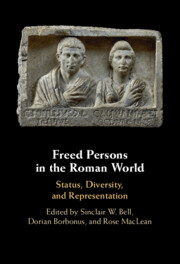Book contents
- Freed Persons in the Roman World
- Freed Persons in the Roman World
- Copyright page
- Contents
- Figures
- Table
- Contributors
- Acknowledgments
- Bibliographical Note
- Introduction
- 1 Permissu decurionum
- 2 Freed Public Slaves in Roman Italy and the Western Provinces
- 3 Fitting in by Decree
- 4 Doubling Up
- 5 The Cost of Ingratitude
- 6 Between Moral Slavery and Legal Freedom
- 7 Framing the Freed Person
- 8 Novel Evidence for Ancient Freed People
- 9 The Affects of Manumission
- General Bibliography
- Index
- References
6 - Between Moral Slavery and Legal Freedom
Freed People and Aristocratic Behavior in Neronian Literature*
Published online by Cambridge University Press: 16 May 2024
- Freed Persons in the Roman World
- Freed Persons in the Roman World
- Copyright page
- Contents
- Figures
- Table
- Contributors
- Acknowledgments
- Bibliographical Note
- Introduction
- 1 Permissu decurionum
- 2 Freed Public Slaves in Roman Italy and the Western Provinces
- 3 Fitting in by Decree
- 4 Doubling Up
- 5 The Cost of Ingratitude
- 6 Between Moral Slavery and Legal Freedom
- 7 Framing the Freed Person
- 8 Novel Evidence for Ancient Freed People
- 9 The Affects of Manumission
- General Bibliography
- Index
- References
Summary
The Principate of Nero is a well-documented period for a study about the literary evidence on Roman enslaved and freed people. In Neronian literature – as exemplified by Seneca, Persius, and Petronius – manumission is recurrently mentioned as a metaphor for describing forms of aristocratic behavior in imperial times, so that freed people became an important issue in discussions about the moral meanings of freedom and slavery under the Principate and its inherent elite competition for social dominance. Neronian authors criticized certain aristocrats by depicting them as morally acting like enslaved or freed persons, thus becoming examples of an indecorous behavior. The chapter argues that the representations of freed people in this context were related to the legal changes in slavery since Augustus, which involved a kind of surveillance of the practice of manumission and the creation of a new category of freed people, the Junian Latins, that did not automatically entail Roman citizenship. Both aspects had an impact not only on the more immediate relations between enslavers and enslaved persons, and on the social life of enslaved and freed people, but also reconfigured the ideas of slavery shared by the Roman elite.
- Type
- Chapter
- Information
- Freed Persons in the Roman WorldStatus, Diversity, and Representation, pp. 164 - 188Publisher: Cambridge University PressPrint publication year: 2024

